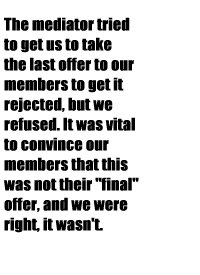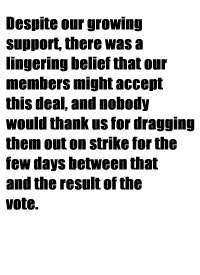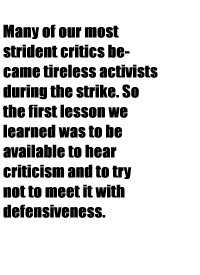

June M. Madeley
2. What I do know is that preparation for this round of bargaining began
well over a year before our contract expired in August of 1999. Most of
our mobilizing and communications activities--reinvigorating our Stewards'
Council, conducting outreach in the academic departments where our members
work, linking up with other labour groups on our campus and across Ontario--were
done with an eye to this round of Bargaining. It was a ton of hard work
and luckily, it paid off for us at MAC.
3. We faced many tests along the way. Working to bring together other university
locals bargaining in Ontario in 1999 proved to be a challenge. The work
of communicating with over 1200 members was also a challenge. We had to
survey their bargaining interests as well as educate them on many of the
issues. We faced some criticism about the tone of our bargaining surveys
(it was viewed as biased by some), but ultimately, this is what you have
to do in such a bargaining environment. With a fairly transient membership
made up of many who don't like to think of themselves as workers, there
is much educative work that needs to be done before members can provide
meaningful responses about their bargaining goals. With this in mind we
set the context for most questions, and this was perceived by some as a
negative bias, but we found that it created a dialogue early on in the
process and we achieved a record response rate!
4. Facing members on issues such as the Bargaining Survey gave us an opportunity
to discuss other issues, to engage members in the broader implications
and goals of bargaining in this sector. Many of our most strident critics
became tireless activists during the strike. So the first lesson we learned
was to be available to hear criticism and to try not to meet it with defensiveness,
but to use the opportunity to connect with the membership. We had many
such opportunities :)
5. There were other lessons, too numerous to mention...and besides, when
I think back on it, it's the roller coaster feeling that still hits hardest.
It's mostly the nausea that comes with not being certain that when you
hit the loop, you won't just fall out of the car and splat on the ground.
There were many such moments for members of our Bargaining Team. During
the first day of conciliation, with our Strike Mandate established, MAC's
negotiators finally showed up with an offer. We thought we were making
progress until they tried to bully us into taking our 5 key issues off
the table as a precondition to continued talks...and that was where things
were at in October! We got them to come back for a second day, but not
without taking some important items off the table. The second day of conciliation
proved useless, save for our resolve to step up strike preparations. The
first meeting of our strike committee took place the next day. Thankfully,
we had a solid core of Bargaining Support Committee Members and a large
and active Stewards' Council to draw upon. When management requested a
No Board(1), it was the Bargaining Team
that first met with the realization that we had to make the threat of a
strike very real if we were going to get anything out of management. Back
then, we still thought the threat of a strike might be enough.
6. Eventually, the Labour Board invited us to mediation talks commencing
on November 16th, 2 days before the strike/lockout deadline. We were confident:
we had held a strike school and we were having weekly strike committee
meetings. On the first day, we sent Management "back to their room" to
do some work; we went to a strike committee meeting back at the union office.
On the second day at around 10pm we told them we would see them in the
morning. There were some veiled threats around claims that we had left
the table, but we fired up the laptop and sent out an e-mail to our members
telling them that they might expect to be lied to about this issue and
that talks would resume in the morning...which they did. But, that was
the date of the legal deadline, and now they knew there would be no strike.
7. The mediator tried to get us to take the last offer to our members to
get it rejected, but we refused. That afternoon, management requested a
Ministry-run vote on their last tabled offer. You will note that I don't
call it a "final offer vote," although that is commonly what such things
are called. This bit of rhetoric was very important to our mobilization
against this offer. It was vital to convince our members that this was
not their "final" offer, and we were right, it wasn't. It is not the 40
minutes before the picket line went up that stands out for me as a stomach
churning time, it's the 5-6 hours after mediation broke off and we were
facing that vote. We knew that only 2 such votes have gone the employers'
way. We knew that, and yet it scared us. Wisely, the bargaining team went
to the bar when talks ended rather than back to the union office. A plan
started to form in the haze of beer and fear. I don't know if anyone ever
said it out loud, but we thought our members might take that deal.
8. Two days later the VOTE NO campaign was in high gear, we still didn't
know when we'd meet with the Ministry of Labour, let alone when the vote
might take place. We had announced a strike deadline of November 26th.
At a special meeting of the strike committee on November 23rd we moved
that deadline to the following Friday, in the hopes that this vote would
take place before then. We met with MAC's negotiators and a representative
of the Ministry on November 25th in order to set up the voters list, voting
locations, date, etc. We went to that meeting praying for the vote to occur
before our new Strike Deadline of December 3rd. Despite our growing support,
there was a lingering belief that our members might accept this deal, and
nobody would thank us for dragging them out on strike for the few days
between that and the result of the vote. Our determination, mixed with
doubt and fear, won out and the vote was set to take place the 2 days before
our deadline. Our strategy was simple: argue that we are ready to resume
talks when they lose this vote--we'd booked a room and set things up with
the mediator. That hour between the close of polls and the release of the
vote results was another of the more ulcer inducing moments of bargaining.
A growing crowd of activists assembled at the union office, some at the
campus bar upstairs, awaiting the results. Those of us on the bargaining
team had promised to be ready to talk that evening, so we were especially
anxious to know the outcome (perhaps even secretly hoping that the deal
would be accepted and we could go back to our comps, dissertations and
research).
9. Management's offer was rejected and we were ready to go back to the
table, but MAC's negotiators refused to come back unless we took tuition
and a 5th year appointment (added job security) off the table as conditions
to talk--after they just lost the vote! We announced the results to resounding
cheers in our graduate pub, located conveniently above our union office.
It only took one round before someone was able to say it out loud: we were
going on strike. A crew began to pack up the necessary items to be moved
to strike headquarters. A team of movers were organized for the next morning,
then we drank lots of beer.
10. The picket lines were due to go up at noon. At 11am, McMaster's chief
negotiator called to ask if we were really going on strike. By this time
the office was mostly empty, we had a crew working on picket signs, the
phone was ringing non-stop, the photocopier was churning out the first
flyer. We were oddly euphoric. I felt bad, wondering if that might play
into stereotypes about unions being strike-happy (although how anyone could
call one strike in 20 years strike-happiness I can't imagine). We hardly
knew what we were doing, we hadn't thought as hard about the actual picket
line as we had about scheduling and what not.
11. I was alarmed at about 2:30pm when the first picketer turned to me and
asked, "so have they called yet?" I thought I might throw up, but things
seemed OK when shortly thereafter the rental goons from London Protection
Services turned up to video tape us. I suppose they were meant to be intimidating,
but they didn't seem to have that effect. We all smiled for the camera
and stopped politely when they needed to change their tape.
12. After the strike began on December 3rd, it was pretty much wait and
see. We were able to engage many of our members on the picket line about
all of the issues and were well prepared when we finally returned to the
table on December 10th, which got us nowhere. After that we were pretty
much resigned to things extending into January and the picketers seemed
to be ok with that. There was that one sleety, rainy, wet, cold day when
many who had signed up did not materialize for their picket shift. Several
of us were called over from strike HQ and spent 4 hours in the puddles
together. That was the day we bought hair dryers and considered starting
a dry sock fund! We probably still have a sack of stylish Gladbag raincoats,
which come in yellow, orange, or clear!
13. The university always closes over the Christmas holiday, so we had pulled
the pickets down for that period of time. It was a long wait for many of
us. I was visiting relatives in New Brunswick and participated in some
decision making over conference calls. While we remained confident in our
support, you never know how long into the bitter winter that might last.
More importantly, many of our members in the sciences had completed TA
work prior to the strike, so we wouldn't really know the extent of their
support, in the form of not teaching lab sections, until after January
10th when the labs began. So, our bargaining team wanted to find a way
to get back to the table with management. After approaching the matter
in a few different ways we got a meeting for January 4th; meanwhile
I was stuck at the train station in Montreal. Talks broke off early that
day, but the mood seemed neutral. I was relieved not to have to turn up
at the hotel with my luggage in tow.
14. We gathered in the hotel coffee shop the morning of January 5th, and
noticed some of the University's hot shots arriving also. We all agreed
this was a good sign, since the people at the table from their side are
not empowered to make decisions. We were greeted at the meeting by McMaster's
President, Peter George, the Provost/VP Academic, and the Vice-President
Administration. They all made the rounds introducing themselves and shaking
hands. While it turned out that the Mediator was impressed by these dignitaries,
we were not. We hadn't expected them, so weren't able to plan our unified
blaze response, our team just instinctively knew it meant the opposite
of what they were about to tell us, which was, "there's no more money."
In fact, I have compared notes with other team members and we counted at
least 17 times that Peter George managed to fit in something along the
lines of "there's no more money." We took the opportunity to question these
big wigs on the allocation of money--about the free t-shirts to all staff
to kick off their fund raising campaign, about the new auto flush toilets,
about the pig roast in honour of Sandy Darling, outgoing VP Admin....etc.
Finally, we got down to business, and about ½ an hour after Peter
George left for his meeting, we started seeing more money. There were still
some sticking points --duration, tuition, 10-hour rule(2),
5th year funding, wage gap(3) and other
issues, but progress was being made.
15. We had a visit from the Mayor of Hamilton, Bob Morrow, at around 4:30pm.
The residents who live in the same neighbourhood as McMaster had been complaining
about being unable to get out of their driveways due to the traffic backup.
Unfortunately, by the time he arrived we were already feeling like a deal
might be in the air and we were not terribly focussed on him. I believe
we were working on our next position and were interrupting him constantly
to get agreement on it so that it could be typed up. He seemed to understand.
Still, with all these dignitaries turning up on the last day, we wondered
if we should hold out for a visit from the Minister of Labour :)
16. We were able to make gains on all of our issues. We achieved a tuition
freeze for graduate students, a new benefit, progressive increases to the
employer's contribution to our dental premiums, wage increases for all
categories and some closing of the wage gaps between pay categories, changes
on the 10-hour rule, both in our Collective Agreement and in the Graduate
Calendar, some money attached to a commitment to work on 5th year funding
(although, not in our contract and not necessarily TA funding), some health
and safety improvements and some other language changes. We lost no money
due to the strike, and those who picketed received extra money from their
picket pay. In short, we won. We never thought we'd be able to pull it
off, and many times I thought we'd lost the "Star Wars" ending for good,
but then things turned around and seemed hopeful again. It was a very long
year, but nearly everyday I am part of or overhear a "war story" from the
Strike..its already become part of the consciousness here and will be alive
and well in August of 2002!
1. Basically, collective bargaining in Ontario works like this: the Union and Management sit down and try to hammer out a collective agreement. If they aren't getting anywhere, they can ask the government to appoint a conciliator, who tries to help bring the two parties closer together. At any time during conciliation, either party can ask the conciliator to issue a no board report -- this shuts down talks, starts the clock ticking toward a legal lockout/strike deadline and sets in motion the mediation process. In mediation a third party will again be appointed by the Ministry to help the parties come together on the outstanding issues, although at this stage the deadline creates pressure on both sides. Once the no board report is processed (roughly 3-5 days after it was requested), there is a 17 day cooling-off period before Management could lock the union out, or the Union could legally call a strike.
2. While the rule that restricts graduate students in Ontario to 10 hours of paid work per week (on or off campus) has been removed from legislation for several years, the Graduate Deans in Ontario continue to cling to it. MAC is one of few Universities that not only enforces it, but actively sought out students who broke the rule and punished them by taking away TA appointments or scholarship monies. We were looking for relief from this draconian restriction, which we got in the end. They argued that this is an academic matter and not a subject for negoations
3. Our undergraduate
members were being paid roughly a third of what Master's and Ph.D. students
were paid, and those who were post funding (3rd year of Masters's
or 5th and succeeding years in Ph.D) were having their wages
slashed to about half the rate for incoming Teaching Assistants. Closing
these gaps in wages, which we did, was a primary goal for us in bargaining.
June M. Madeley, Interim President, CUPE 3906
   |